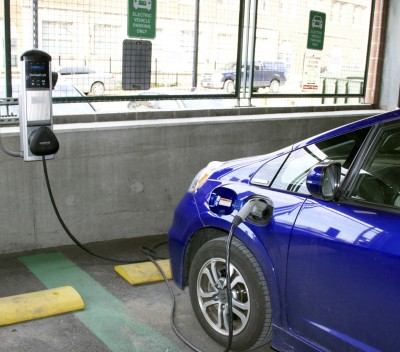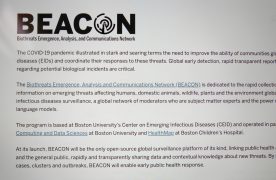Massachusetts Gov. Charlie Baker agreed to provide an additional $2 million to the Massachusetts Offers Rebates for Electric Vehicle Program on April 2, according to a Friday press release from the Massachusetts Sierra Club.

MOR-EV, funded by the Executive Office of Energy and Environmental Affairs’ Department of Energy Resources (EEA), provides $2,500 rebates for Massachusetts drivers who purchase or lease full battery electric vehicles and $1,500 for those who purchase or lease plug-in hybrids, the release stated.
“Electric vehicles have off-the-charts customer satisfaction ratings because they are fun to drive, and people love zooming right past the gas station,” Gina Coplon-Newfield, the Sierra Club director of Electric Vehicles Initiative, said in the release. “We applaud this example of the Baker Administration’s investment in cleaner cars, healthier air and a safer planet.”
In 2014, approximately $1.5 million in rebates were issued to Massachusetts drivers through the program, according to MOR-EV’s website.
Emily Norton, director of the Massachusetts Chapter of the Sierra Club, said the additional funds into MOR-EV serve to provide important and much-needed incentives to allow people to try new technologies.
“We were actually instrumental in the establishment of that rebate program because when we looked around at other states which have higher levels of electric vehicle adoption, we found that they often have an additional financial incentive to make it easier for people to be able to afford one,” Norton said.
Norton said the high cost and relatively small number of electric vehicles on the road can be attributed to hesitation to try a different type of car.
“Electric vehicles are a new technology, and they are different, so you have to get people over the hump to even consider a car that is plugged in instead of taken to the gas station, or plugged in in addition to being taken to the gas station,” she said. “They are relatively more expensive as they are a new technology, but as more people purchase them, the price is expected to come down.”
Norton also said the state rebate on electric cars is not the only incentive offered to purchasers of electric cars, but that such incentives are in addition to existing federal programs.
“There is already an existing $7,500 federal credit, so the $2,500 here in Massachusetts helps to save $10,000 off the price of electric vehicles” she said. “When you look at the fact that the vehicles run on battery only, there’s much lower maintenance cost, you have no oil changes, there is less wear and tear and electricity is the fuel you are purchasing rather than gasoline.”
The Massachusetts Electric Vehicle Initiative, part of the EEA, aims to reduce greenhouse gas emissions, promote economic growth and protect public health and air quality by reducing other transportation-related air pollution, according to its website.
In May 2014, eight state governors collaborated to release a collaborative Multi-State Action Plan to be implemented in cities on the east and west coasts. The plans develop infrastructure, coordinate policies, codes and standards and set a goal for a consumer market projected toward 3.3 million zero-emission vehicles in use by 2025, according to the Massachusetts EEA website. California, Connecticut, Maryland, New York, Oregon, Rhode Island and Vermont partnered with Massachusetts to promote the cause. In combination, these vehicles make up approximately a quarter of the United States’ new car sales.
Massachusetts set a goal of 300,000 zero emissions vehicles or 15 percent of the projected registered vehicles in the state in 2025, according to the Massachusetts EEA.
Several residents said they realized the positive impacts of an electric car incentive program on the environment, but were cautious about the source of funding for the program.
David Miller, 31, of Fenway, said he doubts both the source of the funding and the potential outcome.
“I’m not sure where the budget is going to come from, [or] what’s actually going to support the green initiative,” he said.
Carina Traub, 21, of Fenway, questioned whether there are more appropriate programs to be investing in currently.
“[Funding the electric car incentive program] is okay because I like the environment, but also if you think more critically, you have to think where the money is coming from and what else it might have been able to be used for,” she said.
Syed Ahsen, 21, of Brighton, said she agrees with the parameters of the program and predicts MOR-EV will serve to fulfill the primary purpose of environmental preservation.
“So if they want to motivate those electric car owners, then this is a good way to switch people from using fuel cars to electric cars,” he said, “which is better for the environment.”













